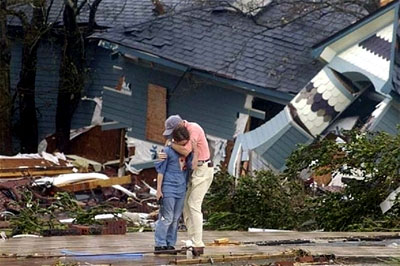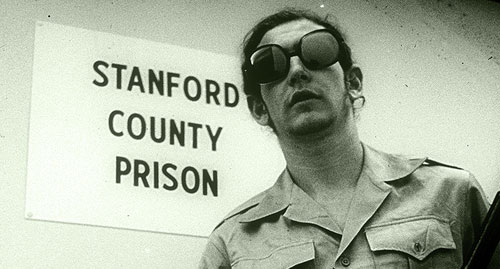PoW: the fine line between heroes and villains
 In a 1961 study called Disasters and Mental Health: Therapeutic Principles Drawn From Disaster Studies, the sociologist Charles Fritz pondered: "Why do large scale disasters seem to produce such mentally healthy conditions?" Fritz noted that disasters often seemed to bring out the best in people - calm, courage, organization, interconnectedness, self-sacrifice - while these virtues laid dormant during more mundane conditions.
In a 1961 study called Disasters and Mental Health: Therapeutic Principles Drawn From Disaster Studies, the sociologist Charles Fritz pondered: "Why do large scale disasters seem to produce such mentally healthy conditions?" Fritz noted that disasters often seemed to bring out the best in people - calm, courage, organization, interconnectedness, self-sacrifice - while these virtues laid dormant during more mundane conditions.
Fritz suggested that one of the reasons for this was to do with time: "In everyday life many human problems stem from people's preoccupation with the past and the future, rather than the present. Disasters provide a temporary liberation from the worries, inhibitions, and anxieties associated with the past and the future because they force people to concentrate their full attention on immediate moment-to-moment, day-to-day needs." This shift in focus "speeds the process of decision-making" and "facilitates the acceptance of change."
Rebecca Solnit, who is giving a sermon on hope and disaster at the School of Life on May 8, explores this phenomenon in her book, A Paradise Built In Hell: The Extraordinary Communities That Arise In Disasters. Solnit counters the conventional view that, when disaster strikes and order breaks down, the primitive evil lurking in our nature is released, and we go on a Hobbesian rampage of brutality, looting, rape and murder. We're sold this story by the media (think of The Road's terrifying vision of cannibal warlords roaming the US after an ecological apocalypse) and by governments and law enforcement officials eager to exert their power over the masses.
But actually, Solnit argues, people naturally band together during crises, and organize themselves in intelligent and resilient ways. Heavy-handed government interference can simply get in the way. It reminds me of the TV presenter Dan Snow, who set off across the Channel in a dinghy to rescue Brits left stranded by Volcanic ash in 2009, only to be turned back by the Calais port authorities because he didn't have the right permit.
Now I agree with Solnit that wars, revolutions and disasters can bring out the best in us. They lift us out of our modern atomization, and reconnect us to our long history as tribal animals working closely together against common threats. It feels good, because suddenly we can throw off the shackles of our dull industrialized lives and remember what it's like to be a member of a tribe.
However, perhaps I am being pessimistic, but I also have some sympathy with the 'evil within us' view. Our tribal wiring means we can be incredibly kind and helpful to 'insiders', but we can also be vicious and inhumane to 'outsiders' - to the weak, or the alien, or those officially deemed as 'the Enemy'. There's something hugely optimistic about people coming together on the streets to protest against special economic interests and to demand a better world. But there's also something depressing, and worrying, about young people chanting 'Tory scum', their eyes glassy, their faces screwed up with hate.
 Extraordinary situations can bring out the angel within us, but also the devil. I am fascinated by the work of the psychologist Philip Zimbardo, who makes just this point in his book The Lucifer Effect: How Good People Turn Evil. Zimbardo is best-known for conducting one of the most notorious experiments in the history of psychology - the Stanford Prison Experiment - in 1971. The experiment involved 20 students being allocated either the role of prisoner or prison guard in a simulated prison, to see how they would react to the situation.
Extraordinary situations can bring out the angel within us, but also the devil. I am fascinated by the work of the psychologist Philip Zimbardo, who makes just this point in his book The Lucifer Effect: How Good People Turn Evil. Zimbardo is best-known for conducting one of the most notorious experiments in the history of psychology - the Stanford Prison Experiment - in 1971. The experiment involved 20 students being allocated either the role of prisoner or prison guard in a simulated prison, to see how they would react to the situation.
The experiment was supposed to run for two weeks, but Zimbardo had to stop the experiment after less than a week, because the guards' behaviour had become sadistic, and several of the inmates had suffered emotional breakdowns. Were the guards 'evil'? Not necessarily. Perhaps they simply went along with the situation. They got caught up in what Zimbardo calls the 'expanded present'. They didn't think about what they were doing, or how it would look in the cold light of some future day.
And this is what can often happen in moments of excitement, disorder and upheaval. As Charles Fritz notes, people's consciousness expands during such moments, and they live intensely in the moment. They behave spontaneously and instinctively, which means they often instinctively follow the social cues of their environment, just as our tribal ancestors would have done. That can be good - or it can be very bad. Think of the reporter Lara Logan, assaulted by a gang of Egyptian men chanting 'Jew', in the middle of all the euphoria of Tahir Square in Cairo.
Can we train ourselves, as individuals and societies, so that when disasters happen, when order breaks down, the angels of our nature are released, as opposed to the devils? That's actually what Zimbardo is working on now, via something called the Heroic Imagination Project (HIP). It aims to teach young people about the situational cues which can bring out their dark sides, hopefully to make them more resistant to them.
HIP also tries to give young people role models for heroism, from history, literature and film. Tim Hetherington, the photo-journalist who was tragically killed in Libya last week, was working on a project to show how soldiers often modeled their behaviour on cinematic depictions of solders. We copy and imitate the models we see, and we can consciously soak our imaginations in positive role-models, so that we imitate the highest aspects of our nature, rather than the lowest.
 Then HIP tries to get young people into the habit of social action, compassion, courage and vigilance - rather like the Boy Scouts I guess - so that they instinctively do the right thing at the right time, without thinking about it. And finally, HIP teaches young people that heroes aren't necessarily the self-sufficient and solitary warriors that Hollywood sells us - the John Waynes, the Clint Eastwoods, the Rambos. Actually, the real heroes of history, suHere'sch as Nelson Mandela or Martin Luther King, are often heavily reliant on networks of activists, colleagues, friends and neighbours working together.
Then HIP tries to get young people into the habit of social action, compassion, courage and vigilance - rather like the Boy Scouts I guess - so that they instinctively do the right thing at the right time, without thinking about it. And finally, HIP teaches young people that heroes aren't necessarily the self-sufficient and solitary warriors that Hollywood sells us - the John Waynes, the Clint Eastwoods, the Rambos. Actually, the real heroes of history, suHere'sch as Nelson Mandela or Martin Luther King, are often heavily reliant on networks of activists, colleagues, friends and neighbours working together.
We can try to develop that. At its simplest, this means meeting each other, meeting our neighbours, meeting the strangers who live next to us, and acknowledging that we have more in common than our post code. Because who knows - one day our lives might depend on each other.
In other news:
Here's a review by Bill Easterley of an important new volume in happiness studies by Ed Diener, Daniel Kahnemann and John Helliwell, which appears to further weaken the case for the Easterlin Paradox (which suggests the correlation between rising income and rising well-being is weak).
Here's an NYT piece about a new study, which has found the happiest countries in the world, and the happiest states in the US, are also the places with the highest incidence of suicide.
Here's a fascinating blog by Christopher Peterson, one of the founding fathers of Positive Psychology, which asks whether the field has led to an upsurge in forced cheerfulness. He ponders: "Is positive psychology to blame for conspicuous cheerfulness? Maybe yes, maybe no. But I do know that a gathering of positive psychologists is rather overwhelming, with all the hugs and the nonstop expressions of satisfaction and success. Ugh."
Here's the Archibishop of Canterbury's excellent Easter sermon on happiness and being human.
And finally, here's the first episode of Jon Ronson's new Radio 4 show, which looks at two amazing stories of people who hear voices. The first is a successful academic who has heard voices since she was a teenager. She refuses the label 'schizophrenic' and has learnt to manage her voices without anti-psychotic drugs. The second story is even more extraordinary: a woman who heard a voice claiming to be a Great Ormond Street surgeon, who warned her she had a brain tumour and gave her the address of a neurosurgeon. She went to a psychiatrist instead who, intrigued, sent her to have a brain scan. Sure enough, she had a brain tumour. "Glad to have helped you", said the voice, and never came back. The episode features the songs of the wonderfulKate Daisy Grant.
See you next week,
Jules
